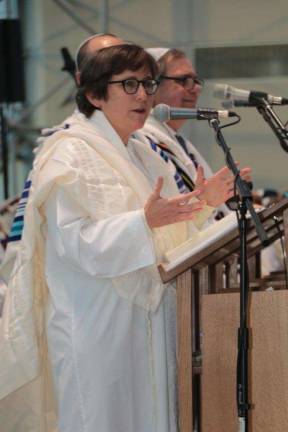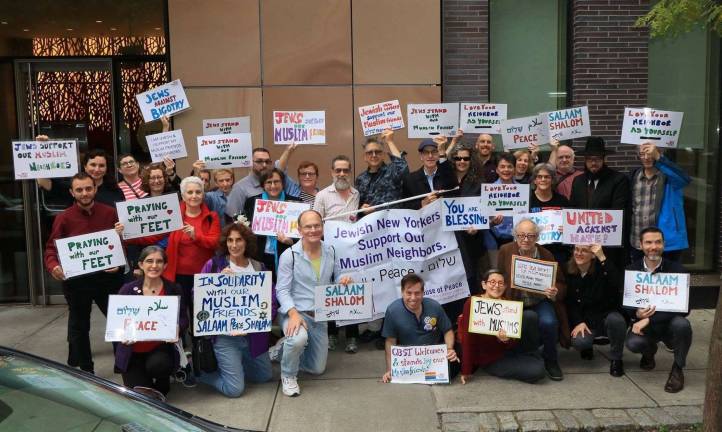A Rabbi Who Doesn't Just Preach Tolerance


By Harvey Cohen
Recent research indicates that fully 90 per cent of LGBTQ students in New York claim to be the victims of harassment, slurs and general maltreatment. And the latest national crime statistics show a year-to-year increase in homicides resulting from anti-LGBTQ hate crimes at an almost impossible to believe 86 percent.
So it is obvious that despite many gains, members of the LGBTQ community still face persecution, isolation and increasing violent and deadly assaults. In this environment, who can guide them? Comfort them? Meet their spiritual needs? And connect them to a God so many of them seek?
In Manhattan, there is a place and there is a spiritual leader who has accepted this challenge. Rabbi Sharon Kleinbaum has been the rabbi at Congregation Beit Simchat Torah on West 30th Street since 1992.
Arthur Leonard, a professor at New York Law School and the co-chair of the search committee back then, says this about why she was chosen as the congregation's very first rabbi: “Rabbi Kleinbaum was the best combination of warmth, depth of knowledge and superior ability to communicate.”
Kleinbaum was born in 1959 in Manhattan in a very progressive home that was totally connected to their Judaism but not at all observant. She traces her own progressive leanings back to 1968 when she was just nine years old and worked feverishly for Eugene McCarthy, the anti-Vietnam war candidate for the Democratic Presidential nomination.
After graduating from Barnard College in Manhattan, Kleinbaum began working at the National Yiddish Book Center in Hadley, Massachusetts. She always had a deep love of Judaism, but it was working at the Yiddish Book Center, surrounded by wisdom of the ages, where her love really blossomed and she became aware of her deep desire to teach Judaism and lead others on their spiritual journey. Around that time, she came out as gay and actually decided she wanted to become a rabbi. She says: “I wanted to become a rabbi so I could create Judaism for people like me who felt alienated from Judaism or on the outside.”
But back in those days becoming a rabbi wasn't easy for a woman and nearly impossible for a gay woman. The reform movement had only recently accepted the idea of women rabbis, but gay rabbis were still many years away, even in that very progressive form of Judaism.
It was only the Reconstructionist movement that then allowed gay rabbis. So her only path was to enter the Reconstructionist Rabbinic College, which she attended and was ordained from.
Her memories of her early years at Congregation Beit Simchat Torah are filled with the recollections of the devastating AIDS epidemic. She recalls that “fully 40 percent of our members died from AIDS and I was constantly going to funerals and burying members of my own generation.”
One episode particularly stands out for her. She was at the bedside of a dying gay father who was surrounded by his two young daughters. She not only needed to comfort the dying man but perhaps even more so the two girls.
Years later those two girls visited the synagogue to meet their father's old friends and to once again thank Kleinbaum for her warm support, when they and their father needed it most.
Kleinbaum and her deeply progressive views have not been without controversy. Several years ago, when she expressed sympathy for Palestinian children who were dying in Gaza, one member of her board of directors resigned along with several members of the congregation.
Kleinbaum, who says she is pro-peace, pro-Israel and pro-Palestinian, also receives her share of hate mail and hostile posts on social media. Recently someone posted on Facebook: “God will PUNISH you by having a Jihadist behead you.”
But she goes on, and she has helped build a thriving congregation, with 200 to 250 people attending Friday night services each week and over 4,000 coming to High Holy Day services every year at the Javits Center.
In May of last year, she brought on an Ultra-Orthodox, straight rabbi to assist in her efforts to serve all elements of the Jewish community. Rabbi Michael Moskowitz now works with Kleinbaum reaching out to, among others, Orthodox Jews who are struggling with their sexual identity (sidebar). The two rabbis originally met in the back of a police van where they had both been arrested and handcuffed for protesting in support of immigrants known as “Dreamers.”
For Kleinbaum, the job is never over and the challenges keep coming. Her congregation continues to grow and she continues to strive to meet their need by constantly adding new programs and services. Her latest initiatives include finding better ways to meet the needs of elderly LGBTQ people and to help the children of LGBTQ find answers to their questions and comfort in their lives.
As she says: “in the time I have left, I want to walk humbly with God and bring justice and passion with every step I take.”
One person's struggleExcerpts from an email received by Rabbi Michael Moskowitz, colleague of Rabbi Sharon Kleinbaum:
“I don't think I stand unique; quite the contrary, I'm one of many in this situation. I'm a married frum [Orthodox] man with strong desires for other men.
I do love my wife and family and fear losing them if this secret were to be exposed. As a Rabbi, you can't condone my actions and yet who am I really fooling ... I'm angry and upset and grew up with a sense of shame and knew that this is something I had to hide from the world.
This worked for many years and I was able to put this “issue” in a box and compartmentalize my life, but for whatever reason the desires are only getting stronger and my behavior acting on it proves it. I know of some people who have come out and their family dynamic drifted apart and only seems to have worked out for one person — themselves ...I have built my life around my family and my only identity at this juncture of my life is through them. I don't want to mess that up either.
I'm not entirely sure what it is that you can really say to make the situation any better.”